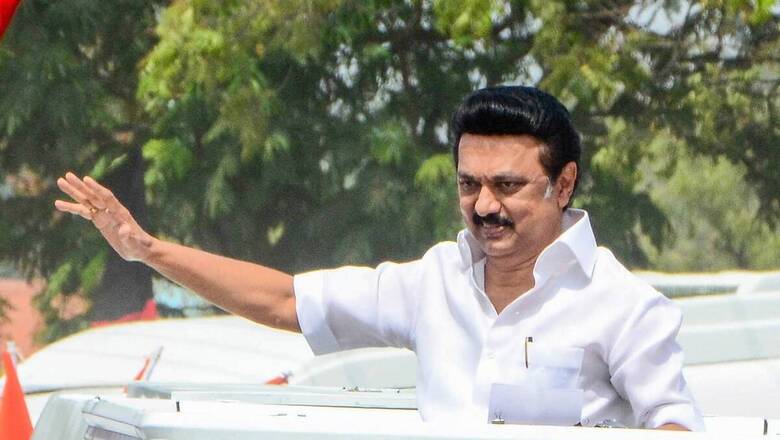
views
As he takes a long-delayed drive down the Marina beach to the seat of power at Fort St. George, riding the crest of a handsome victory scored by his Dravida Munnetra Kazhagam (DMK) in the Tamil Nadu assembly elections, Muthuvel Karunanidhi Stalin should be a contented politician. And a very worried chief minister.
He has proved that his late father and DMK colossus, M Karunanidhi, was right in choosing him as his successor in the Dravidian party that is heavily laden with an enviable cadre base and a political culture rooted in rationalism. Not only did Stalin hold the DMK together after the demise his father in August 2018, he has now achieved such a decisive victory that it might even alter the state’s political spectrum and push him up the UPA (United Progressive Alliance) ranks at the national level.
His main adversary, the All India Anna Dravida Munnetra Kazhagam (AIADMK), could suffer desertions. Those choosing to part ways with their vanquished chief minister, Edappadi K Palaniswami, or EPS, might end up outside Stalin’s party office if they have not already been snapped up by the Centre’s ruling Bharatiya Janata Party (BJP), which could promise them a bright future.
There’s a good reason why I started this column by saying Stalin’s was a long-delayed drive to the CM’s office at the state secretariat. I must flip my calendar pages back to 2017 and freeze on that day when Stalin’s actor-son, Udhayanidhi, and son-in-law, Sabarish, who is considered a master strategist, walked into my cabin at the Deccan Chronicle with the invitation to participate in the 75th anniversary celebrations of the DMK organ, Murasoli.
A few routine pleasantries passed, including my praising of Udhayanidhi’s performances as an on-screen hero, while he told me that he was not just a cinema person but had politics running in his blood. He also said he was the CEO of Murasoli — founded by his grandfather as a handwritten one-pager way back in 1942 — and that he helped bundle the papers when he was a child.
And then, as we sipped tea, I mentioned to them there was a general feeling that if only Karunanidhi was around and active, he would have launched preparations for the ceremonial drive to Fort St. George the moment his bête noire, J Jayalalithaa, was taken to Chennai’s Apollo Hospital (September 22, 2016) due to bad health. Some DMK seniors were known to have exchanged bitter murmurings that Stalin missed the sharp sting which set his father’s shrewd politics apart — and that explained the post-Jayalalithaa survival of the AIADMK government.
Sabarish and Udhaya exchanged quick glances, as if to say they had heard this before, perhaps multiple times. I remember Sabarish responding and it was something like this: “Our leader is keen that he must only take the straight path, get the people’s mandate, and there must be no shortcuts.” That was something rather unusual in politics — both of the Kautilyan and the Karunanidhi schools of strategies wherein the end justifies the means.
DMK insiders say when the party won the elections in 2006, there was heavy pressure on Karunanidhi to make Stalin the CM while keeping the party reins to himself. But the patriarch refused, giving the son, who had toiled at the poll campaigning, the position of deputy CM three years later. It was only in January 2013 that Karunanidhi named him as heir apparent.
Stalin not just allowed Jayalalithaa’s successors — first O Panneerselvam and thereafter EPS — have smooth sailing in their dealings with the Opposition both within the assembly and outside, he also encouraged the sprouting of positivity in their mutual relationship. For the first time in decades, we in the media galleries gawked at the CM and the Leader of Opposition exchanging smiles and nods at times, whereas it had often been sneers and screams in the past. There have been terrible instances of harsh animosity, such as when Jayalalithaa forbade her minister from attending the funeral of his own father because he was in the DMK.
No doubt, Stalin, 68, had learnt many a lesson on decent political conduct from his father, Kalaignar Karunanidhi, notwithstanding the latter being considered among the wiliest of politicians. One of them was to treat even a bitter adversary with due respect. It was evident when Stalin drove over to console chief minister Palaniswami when he lost his mother (October 2020), despite having to wage a painful battle to secure, only through a court order, a tiny bit of beach land from the EPS government for burying his father after his death. Karunanidhi had expressed desire to rest beside the memorial of his mentor, Anna, at the Marina.
During the standoff with the government, many DMK seniors had urged Stalin to sit on a dharna next to his father’s body, as that would bring huge pressure on the government to yield on the beach memorial. Stalin dismissed the suggestion, insisting that he did not want to dishonour his late father by displaying his body for a public agitation and that such an emotive issue taken to the streets could blow up into an uncontrollable law-and-order problem. Along with his sister, Kanimozhi, and some party seniors, he went to the CM’s house to plead for the burial space, but the latter turned it down, saying there was a court order against having any more memorials at the Marina. Stalin then got the DMK legal wing to move the Madras high court, where the judges in an urgent hearing ordered the government to provide place at the Marina within the Anna Memorial “for decent burial to lay the mortal remains” of Karunanidhi.
Stalin broke down when the court news reached him, waiting in anguish beside his father’s body kept at the Rajaji Hall for the people to pay their last respects. Recovering quickly, he took the mike to tell the restive crowds that their late leader would rest beside his Anna and appealed them to maintain peace and dignity. The mature handling of that hugely volatile situation earned Stalin accolades even from his hard critics.
And even now, when all exit polls predicted the DMK’s victory, he was quick to react with a message to the cadres, asking them not to celebrate in public and risk Covid infection for themselves, their families and the public. “Let the streets and roads remain empty while our hearts overwhelm with joy,” Stalin said in a statement on Friday (April 30).
It was clear that Stalin desired to chalk out his own brand of political conduct, quite different from his ‘Dravidian ilk’, deviating from his image in his youthful days that had a liberal dose of controversies.
There was no dearth of challenges and setbacks the DMK faced or suffered over the decades since Karunanidhi took charge following the demise of party founder CN Annadurai (Anna) in 1969. The party’s government was dismissed twice (1976, 1991); several leaders, including Stalin, were detained during the Emergency; Vaiko quit the party and launched the Marumalarchi Dravida Munnetra Kazhagam (MDMK) after accusing Karunanidhi of giving prominence to Stalin; the invincible MG Ramachandran’s magic hold on the electorate plastered the DMK to the Opposition benches during 1977-87; and later his protégé, Jayalalithaa, repeated that pain by dominating the political centre stage. Apart from helping his father build and consolidate the DMK amid all those multiple challenges, Stalin laboured real hard, strengthening his own political wings through trials and tribulations, which included the bitter battle he won against elder brother MK Alagiri for the successor tag.
Karunanidhi loved the media, taking pride in repeatedly reminding us all that he was “first a journalist and then a politician”. His press conferences were frequent and lively. And Stalin would always be there, standing behind at a corner, listening intently to the journalists’ questions — at times harsh and embarrassing — and his father’s elaborate replies often doused in wit and researched backgrounders. “As long as his father was alive and active, Stalin seldom obliged any journalist’s request for interview or his views on a particular issue. ‘Please ask thalaivar (leader), I have nothing to say’, would be his template response,” recalled ‘Arivalayam’ D Sekar, a veteran in covering the events at Anna Arivalayam, the DMK headquarters.
Such DMK beat reporters would also recall how Stalin’s speeches would be rather low-key when he shared the platform with his father, and if someone did point out to him that he could have been a bit harder in his attack on political adversaries (read the AIADMK leadership), he would just smile and shrug as if to say that headlines part was reserved only for Kalaignar. Also, Stalin would never ever publicly refer to Karunanidhi as his father, always calling him the thalaivar (leader).
The familiar punch, as always with the political brood, has been that Stalin plucked the plum easy perched on papa’s shoulder. It had started in his teen days when he was first spotted canvassing for the DMK in the 1971 state elections. At that time, he had a local youth group, Gopalapuram Ilaignar Manram, which gradually grew into the party’s youth wing that became the DMK’s backbone in all its political battles.
For a small recap of Stalin’s political journey, he became MLA for the first time in 1989 and Chennai’s first elected mayor in 1996. He built nine flyovers in the city to reduce the traffic congestion and launched his pet project called, Singara Chennai (Beautiful Chennai). He was made a minister in Karunanidhi’s cabinet in 2006 and promoted as the deputy CM in May 2009. And he undertook extensive touring of Tamil Nadu during 2015-16, covering its nooks and corners and meeting people under the tree shade and by the roadside in the course of another pet theme, Namakku Naamey, aimed at the youth; he donned pants instead of the DMK dhoti, wore white walking shoes and looked real cool behind trendy goggles.
As a minister/deputy CM, Stalin truly slogged to impress. It was said files stayed the shortest time at his table compared to months that his experienced colleagues in Karunanidhi’s cabinet took to clear their work. I must recall here an evening chat with former IAS officer Ashok Vardhan Shetty during those days, when he was the secretary of rural development and panchayat raj that came under Stalin’s charge. It was 8pm and two cups of tea were downed already when I asked him in honest curiosity if it was normal for senior babus to stay that late at their desk. Quick was the response: “My boss is still in his office; how can I leave?” Shetty was one of the most consulted and trusted bureaucrats for Stalin.
I spoke to Shetty again to ask him what he thought his ex-boss would be like as the CM. “It would be great for Tamil Nadu if he continued in the same honest and committed manner that he ran his office as a minister and deputy CM, and I have no reason to doubt he wouldn’t do that,” replied Shetty. “He shied away from doing anything wrong or controversial, and would never allow any party heavyweight, minister or family member to influence decisions. Like his illustrious father, Stalin too put in real hard work, disposed files quickly, put in meticulous preparation for every assembly session, and had travelled Tamil Nadu extensively to learn first-hand the people’s problems.”
Senior IAS officers liked working with him because he was courteous, and a good listener who was open to their ideas and advice. He had good officers in key posts and gave them latitude. “I can say for sure that during his five years as my minister (rural development and local administration), all recruitments and procurements were done solely on merit sans even a whiff of a scandal — which was why his political rivals couldn’t find anything to pin him down,” said Shetty, who is himself known for his intelligence and integrity.
All those who had worked closely with Stalin at the secretariat would vouch he was above petty politics and that he never discriminated against the AIADMK local bodies’ chiefs when it came to conferring state-level awards or recommendations for central awards. “There was an AIADMK president of a village panchayat near Mettupalayam in Coimbatore district who had done outstanding work. Stalin overruled the DMK district secretary’s objection to his visiting that village and even included its president in the list of 15 award-winning village panchayat presidents for that year. And that was not just a solitary case of his applauding good work without political discrimination,” said Shetty.
With Stalin at helm, Tamil Nadu could be headed for better times, but there are matters crying for his urgent attention. To begin with, the Covid-19 pandemic and the crippling state economy must now be creasing Stalin’s forehead deep and dark even amid all the pride and joy of poll victory.
Read all the Latest News, Breaking News and Coronavirus News here. Follow us on Facebook, Twitter and Telegram.










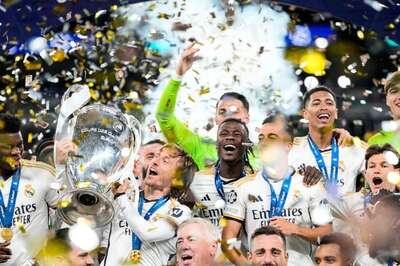
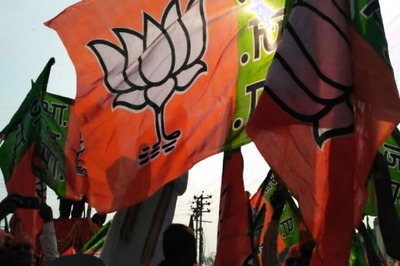

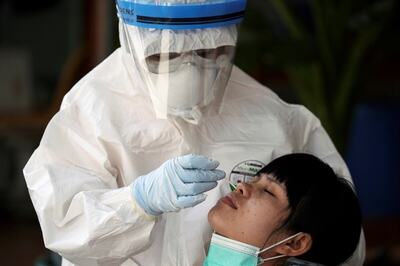


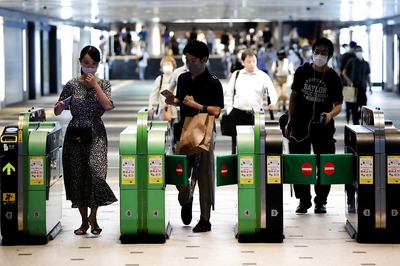

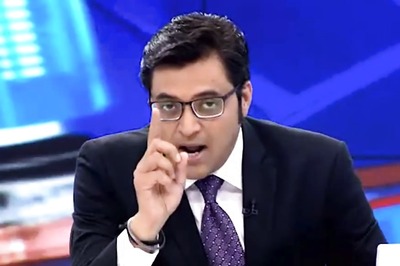

Comments
0 comment